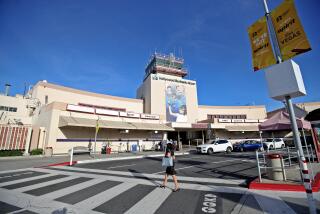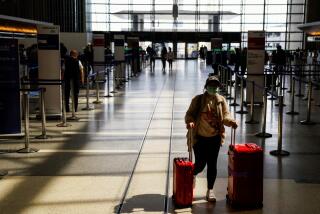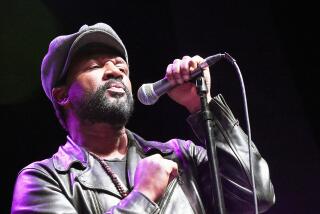Luggage tracking apps aren’t 100% accurate. People are the weak link
- Share via
On a September vacation to celebrate their wedding anniversary, Marci and Eric Rose landed in Greece on an American Airlines flight and were notified by the airline’s smartphone app that their baggage was waiting for them at the baggage carousel.
The app was wrong.
For the record:
1:05 p.m. Nov. 6, 2019A previous version of this story erroneously attributed a quote to American Airlines spokesman Curtis Blessing about his airline developing new technology for its baggage tracking app. The quote should have been attributed to Ray Lane, a representative for Alaska Airlines.
The luggage made the first leg of the trip, from Los Angeles International Airport to Chicago’s O’Hare International Airport, but had not been loaded into the plane to Greece, despite what the app said. The mishap forced the Simi Valley couple to buy clothes and toiletries until the bags were found and sent to Athens — soaking wet — 2 1/2 days later.
“It was beyond frustrating,” said Marci Rose, a business manager. “I cried. I didn’t have any clothes to wear. There was nothing we could do.”
The nation’s largest airlines have invested millions of dollars in technology over the last eight years to give passengers the ability to track their bags in hopes of addressing the biggest headache of flying: losing luggage. More than three-quarters of airlines worldwide plan to offer their passengers that tracking power by 2020.
But the Roses’ mishap — and social media complaining — shows that luggage tracking technology is far from 100% accurate.
The weak link? People.
“When it involves humans, you will always get errors,” said Peter Drummond, portfolio director for baggage at SITA, an international airline technology company.
A SITA study released in March found that 26% of airline passengers worldwide used a mobile device last year to keep track of their luggage, up from 14% in 2017. An earlier SITA study said 77% of airlines plan to offer passengers real-time baggage tracking information by sometime next year.
The bag-tracking technology varies by airline but all carriers rely on workers, at some point in the loading and unloading of luggage, to manually scan the luggage tags. The accuracy of the system can be degraded, experts say, if airline workers forget to scan a bag or if the luggage tag falls off.
The overall rate of lost or mishandled luggage by all carriers has plummeted in the last decade thanks to airline investments in new luggage sorting and tracking technology. Industry experts say the rate is likely to continue to drop as long as the tracking systems become more automated and less reliant on humans.
“The fewer points of contact with humans the more accurate the system will be,” said Madhu Unnikrishnan, editor of Airline Weekly.
American, United and Delta, three of the world’s largest carriers, offer passengers free luggage tracking services that let them monitor the status of their suitcases at several points along each flight, through a smartphone app, text messages or email alerts.
Alaska Airlines plans to offer a tracking app next year.
“We’re currently developing new technology that will support our baggage loading process,” Alaska Airlines spokesman Ray Lane said. “The improvements will allow our guests to view scans of their baggage through our app and should be ready in 2020.”
Southwest Airlines this month completed installation of 3,400 scanners to improve its baggage tracking system. But the Dallas-based carrier isn’t working on an app so that passengers can track their own luggage.
“There are no immediate plans to offer an external baggage tracking app as this is currently an effort to enhance our internal tracking systems,” Southwest spokesman Brian Parrish said.
Once the luggage is scanned and the information is uploaded into the airline’s tracking system, it is relayed to airline passengers’ smartphones or email accounts.
Experts say an older tracking system that relies on luggage tags printed with bar codes — like those on grocery store items — is not as accurate as newer technology involving radio frequency identification devices (RFID) that emit a signal read by a sensor.
American and United use luggage tags, emblazoned with a bar code to track the bags. A human with a scanning device must scan each bar code when the luggage is loaded or unloaded on a plane.
American Airlines says it is considering switching to a new technology for its luggage tracking system but declined to disclose any details about that switch.
Delta Air Lines became the first major carrier to offer a luggage tracking app in 2011, initially using a luggage tag with bar code that corresponds to a passenger’s travel itinerary. But in 2016, Delta began the switch to tags embedded with RFID chips.
The RFID is scanned by a Delta worker or the signal is picked up by dozens of stationary sensors on belt loaders and elsewhere in the loading process. When Delta switched to RFID tags, the airline touted the new technology as having “a 99.9% success rate.”
Delta representatives say the RFID technology is more accurate than using bar-coded tags because most of the tracking with RFID tags can be done by stationary sensors. Luggage tags with bar codes must be scanned manually.
Delta noted, however, that it partners with international airlines, and not all of them use tracking systems that can communicate with Delta’s luggage tracking app.
The International Air Transport Assn., which represents the world’s largest carriers, passed a resolution in June 2018 calling on all airlines to install baggage tracking technology and recommended that they rely on RFID-embedded tags to track bags.
“RFID is a more cost-efficient method to achieve the industry’s target of 100% bag tracking than using existing bar code technology,” the trade group said in a statement.
The luggage debacle endured by Marci Rose in Greece was not an isolated case.
David Razowsky, an improvisation teacher from Los Angeles, said he flies more than 200,000 miles a year for his job, and the American Airlines tracking app is often wrong about which baggage carousel his luggage can be found on after landing.
“The app is wrong nine out of 10 times,” he said. “It doesn’t help that there isn’t any American employee who knows what’s going on either.”
Even Stormy Daniels (aka Stephanie Clifford), the adult film actress who allegedly had a sexual encounter with President Trump, complained on Twitter about problems with the American Airlines tracking app.
American Airlines is not the only carrier that has drawn complaints over its tracking system. Passengers have complained on social media sites about problems with tracking apps offered by United and Delta.
In response to a request to discuss the accuracy of its luggage tracking technology, United Airlines issued a statement, saying: “As with all technology, we continue to innovate, work on advancements, including improvements in each of our monthly app updates. Overall, customer feedback reflects positive experiences since launching this tool.”
Curtis Blessing, an American Airlines spokesman, acknowledged that the carrier’s tracking app is not supposed to send passengers the wrong information about their luggage, as was the case with the Roses.
He said he doesn’t know how often such errors occur but added that the tracking software is employed by 34,000 passengers a day and “one-off issues do occur.”
Such an explanation doesn’t sit well with Marci Rose, whose luggage was left on the tarmac during a rainstorm in Chicago before making its soggy trip to Athens.
She said she doesn’t plan on flying American Airlines in the future and will always be suspicious of luggage tracking technology, regardless of which airline offers it.
“The technology told us the luggage was in the country we were in, and it wasn’t,” she said. “Of course I’ll be suspicious. Why wouldn’t I be suspicious?”
More to Read
Inside the business of entertainment
The Wide Shot brings you news, analysis and insights on everything from streaming wars to production — and what it all means for the future.
You may occasionally receive promotional content from the Los Angeles Times.











